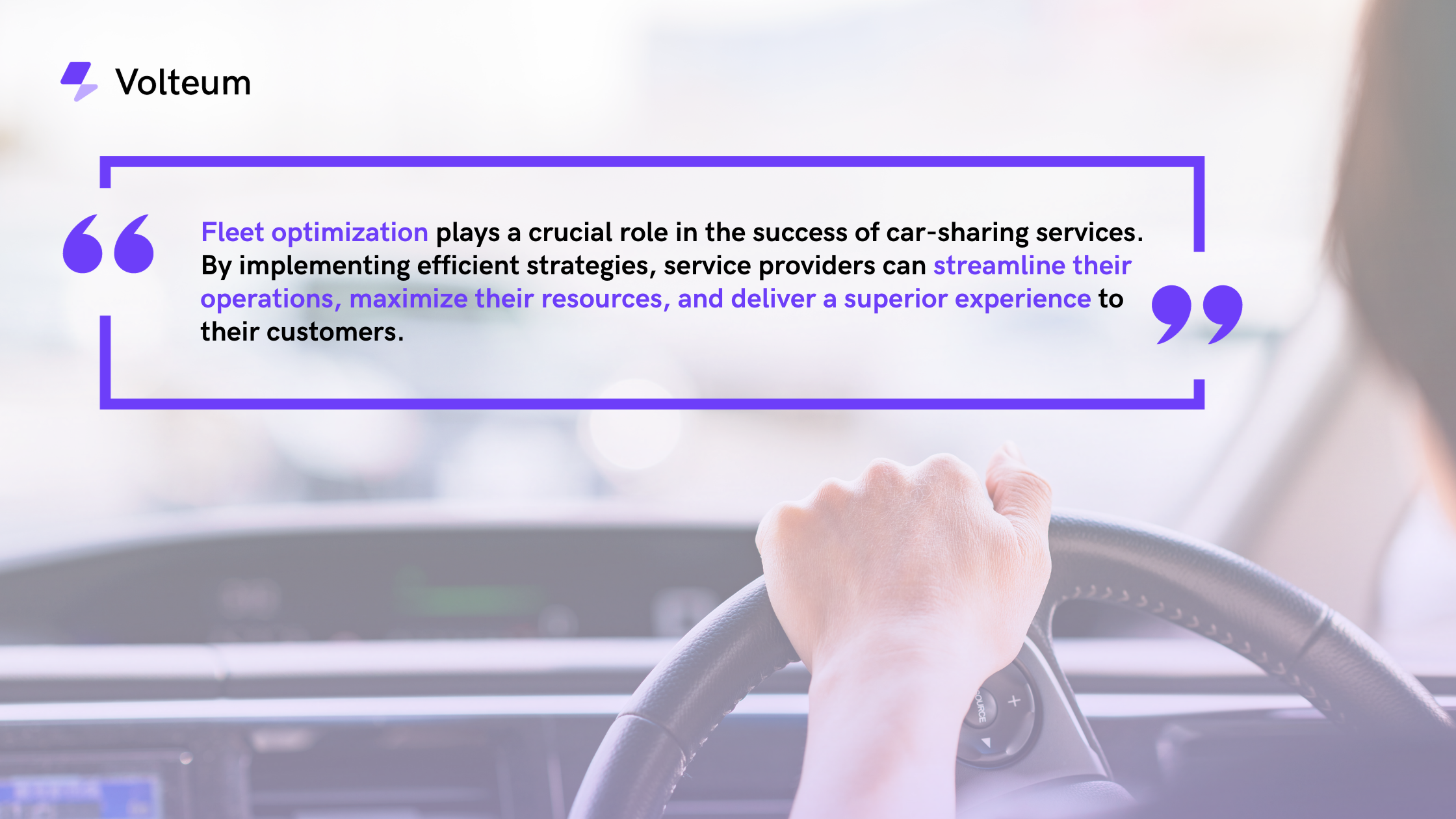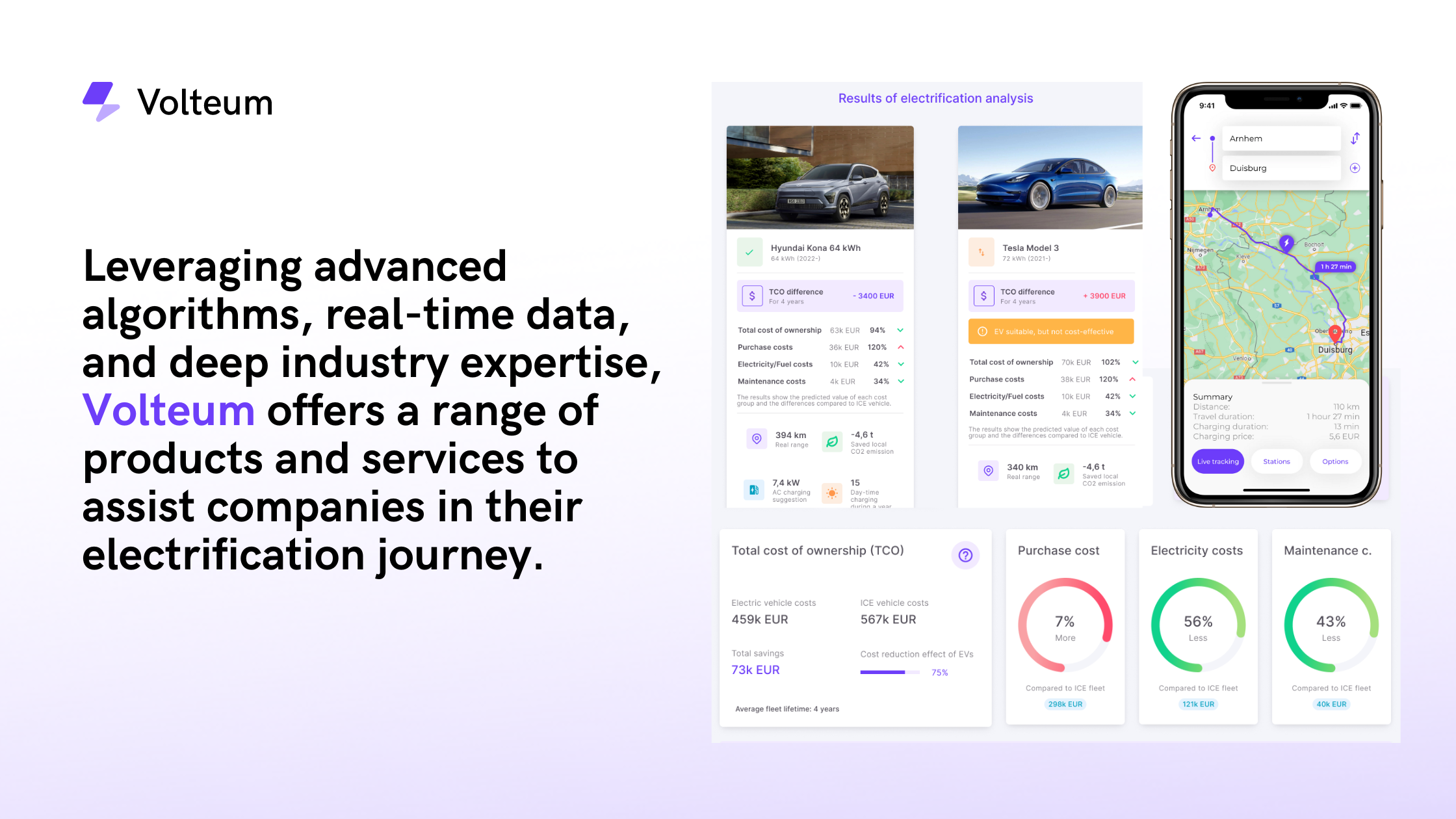The advantages of EVs and fleet optimization for car-sharing services - Part 2
Oct 16, 2023 · 6 min read · blog
In today's world, where sustainability and environmental responsibility are key concerns, embracing electric vehicles and optimizing fleet operations has become a priority for many businesses. Car-sharing services, in particular, can significantly benefit from transitioning their fleets to electric vehicles and implementing efficient fleet management strategies. Not only does it showcase their commitment to sustainability, but it also allows them to reduce costs, improve customer satisfaction, and stay ahead in the constantly evolving market.

In the first part of this blog series, we discussed the advantages of transitioning to electric fleets. In this second part, we discuss the benefits of fleet optimization, strategies for efficient vehicle utilization and charging, and how Volteum can assist car-sharing services in the fleet electrification process.

Benefits of fleet optimization for car-sharing services

Fleet optimization plays a crucial role in the success of car-sharing services. By implementing efficient strategies, service providers can streamline their operations, maximize their resources, and deliver a superior experience to their customers. Let's explore some of the key benefits of fleet optimization for car-sharing services:
- Data-driven decision making: Fleet optimization relies heavily on data collection and analysis. This data-driven approach offers car-sharing companies invaluable insights into customer behavior, vehicle performance, and market trends. By continually analyzing this data, companies can make informed decisions about fleet expansion, maintenance schedules, and strategic partnerships, ensuring they remain ahead of competitors and continuously evolve with the needs of their customer base.
- Improved customer satisfaction: Fleet optimization allows car-sharing services to provide better service to their customers. By optimizing the deployment of vehicles and maintaining a reliable fleet, customers can have greater access to available vehicles and enjoy a seamless experience. This leads to increased customer satisfaction and loyalty, ultimately driving growth and revenue.
- Enhanced fleet safety: Fleet optimization also contributes to improved safety for both drivers and passengers. By monitoring vehicle conditions, tracking driver behavior, and implementing preventive maintenance schedules, car-sharing services can ensure the safety and reliability of their fleet. Intelligent routing and dispatching systems can also help avoid congested areas and high-risk zones, reducing the chances of accidents and promoting safer travel.



Strategies for efficient vehicle utilization and charging

Efficiency is the key to running a successful car-sharing service. By implementing strategies that optimize vehicle utilization and charging, fleet managers can maximize their operational efficiency, reduce costs, and provide a better experience for their customers.
- Maximizing vehicle availability: In car-sharing operations, ensuring that vehicles are available when and where they are needed is crucial to meeting customer demand and maintaining customer satisfaction. With an efficient vehicle utilization strategy, car-sharing services can track real-time demand patterns, strategically position vehicles in high-demand areas, and efficiently rotate vehicles based on usage patterns. This maximizes vehicle availability and reduces the chances of customers being unable to access a vehicle when they need it most.
- Optimizing the charging infrastructure: Managing the charging infrastructure for electric vehicles requires careful planning to ensure that vehicles are charged and ready for use when needed. An efficient charging strategy involves optimizing the placement of charging stations, scheduling charging sessions during off-peak hours to minimize costs, and leveraging smart charging technologies to balance demand on the electrical grid. By implementing these strategies, car-sharing services can minimize downtime due to charging and maximize the availability of electric vehicles for customers.
- Reducing operational costs: Effective vehicle utilization and charging strategies can help car-sharing services reduce operational costs. By optimizing routing and scheduling, service providers can minimize unnecessary mileage, reduce fuel consumption, and lower maintenance costs. Additionally, proper management of the charging infrastructure can help control electricity costs by taking advantage of time-of-use pricing and maximizing the use of cost-effective charging options, such as depot charging. These cost savings directly contribute to the financial viability and sustainability of car-sharing services.



How Volteum can assist car-sharing companies during their electrification process

Volteum is at the forefront of providing comprehensive solutions for fleet electrification. Leveraging advanced algorithms, real-time data, and deep industry expertise, Volteum offers a range of products and services to assist companies in their electrification journey. Here are some ways Volteum can make a difference:
- Customized recommendations: Volteum's Electric Fleet Planner evaluates existing fleets and provides recommendations tailored to specific business needs. This ensures that companies make informed decisions from the very beginning of the electrification process.
- Optimized vehicle and charger selection: The software considers various factors, such as historical activities, range, TCO, and driver preferences, to offer the best electric vehicle models and charger options. This level of customization allows to select the most efficient and cost-effective options for the fleet.
- Optimized route planning: Volteum's Electric Fleet Operations tool accurately forecasts energy requirements, plans the most optimal routes and calculates the exact charging needs of each EV. By leveraging live data and advanced algorithms, car-sharing services can optimize their operations, minimize range anxiety, and reduce charging costs.
- Detailed reports: The tool also provides detailed reports that outline the financial savings and environmental impact of fleet electrification. These reports help businesses track their progress, make data-driven decisions, and communicate their commitment to sustainability to their customers and stakeholders.

Conclusion

In conclusion, car-sharing services can gain significant benefits by embracing electric vehicles and implementing fleet optimization strategies. By leveraging Volteum's cutting-edge software solutions, they can make informed decisions, optimize vehicle utilization and charging, and successfully transition their fleets to electric. The future is electric, and by aligning with this sustainable trend, companies can reduce costs, improve customer satisfaction, and demonstrate their commitment to a greener future.

Ready to embrace the electric revolution and optimize your fleet’s operation? Contact Volteum today to learn how we can assist you in the fleet electrification process!
